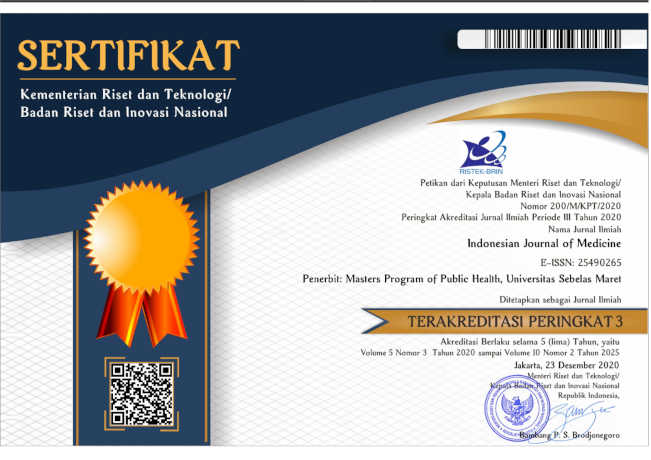Meta-Analysis: Effect of Acupuncture Therapy in Lowering Frozen Shoulder Pain
DOI:
https://doi.org/10.26911/theijmed.2023.8.3.646Abstract
Background: Acupuncture therapy has become a popular non-drug therapy with good curative effects, convenient application, non-toxic side effects, and low cost, and it has been widely used in the treatment of Frozen Shoulder. This study aims to analyze and estimate the effect of acupuncture therapy on reducing the degree of pain in Frozen shoulders.
Subjects and Method: This study used a systematic review and meta-analysis by following PICO, Population: Frozen Shoulder patients. Intervention: acupuncture therapy. Comparison: no acupuncture therapy. Result: reduction in the degree of Frozen shoulder pain. The data used was obtained from scientific research articles from electronic databases including PubMed, Google Scholar, Hindawi, BMC, Scopus, and Science Direct Randomized Control Trial (RCT) designs from 2011 to 2022 which report effect sizes with mean and SD. The keywords used in the search for scientific articles are “Acupuncture” AND “Frozen Shoulder” AND “Frozen Shoulder Pain”. The selection of articles was carried out using the PRISMA flowchart. Data were analyzed using Review Manager software version 5.4.1.
Results: A total of 9 articles with eligible RCT designs from Asia and Europe were selected for the systematic review and meta-analysis. The results of the meta-analysis showed that patients with Frozen Shoulders who received acupuncture therapy experienced a degree of pain 0.48 units lower than without acupuncture and was statistically significant (SMD= -0.48; 95% CI= -1.14 to -0.18; p=0.15).
Conclusion: Acupuncture therapy reduces the degree of Frozen Shoulder pain.
Keywords: acupuncture, pain, frozen shoulder.
Correspondence: Mehdya Vikia Murti. Masters Program in Public Health, Universitas Sebelas Maret. Jl. Ir. Sutami 36A, Surakarta, Central Java 57126. Email: mehdyvikiamurti@gmail.com. Mobile: +62895363037033.
References
Cheing So, Chao (2008). Effectiveness of Electroacupuncture and Interferential Electrotherapy in the Management of Frozen Shoulder. JRM. 40(3): 166170. Doi 10.2340/165019770142.
Hasanah U (2021). Effectiveness of aromatherapy and music therapy to reduce pain in stage 1 labor: Metaanalysis). Tesis. Ilmu Kesehatan Masyarakat, Program Pascasarjana, Universitas Sebelas Maret.
Indana A Z (2021). Meta-analysis of the effectiveness of isometric relaxation and laser therapy to reduce pain in myofascial syndrome in the upper trapezius muscle). Tesis : Ilmu Kesehatan Masyarakat, Program Pascasarjana. Universitas Sebelas Maret
Kementerian Kesehatan RI (2014). Peraturan Menteri Kesehatan RI Nomor 25
Lo MY, Wu CH, Luh JJ, Wang TG, Fu LC, Lin JG, Lai JS (2020). The effect of electroacupuncture merged with rehabilitation for frozen shoulder syndrome: A single-blind randomized sham acupuncture controlled study. J. Formos. Med. Assoc. J. 119(1): Part 1: 8188. Doi: 10.1016/j.jfma.2019.03.012.
Lumunon N, Steicy, Lidwina S, Engeline A (2015). Correlation between Repetitive Arm Movement and Shoulder Pain in Hairdressers at Salons). eCl. 3: 3.
Mazolla A (2020). UltrasoundGuided Peripheral Nerve Stimulation for Shoulder Pain: Anatomic Review and Assessment of the Current Clinical Evidence. 4–8.
Mahandaru AH (2022). The effect of hypnotherapy on postpartum pain and depression in women after smallpox birth). Tesis : Ilmu Kesehatan Masyarakat, Program Pascasarjana, Universitas Sebelas Maret.
Nindrea RD. (2016). Introduction to the practical steps of meta-analysis studies). Yogyakarta: Gosyen Publising
Noer A (2022). Meta-analysis of the effects of acupuncture therapy and ultrasound therapy to reduce the degree of pain in carpal tunnel syndrome. surakarta). surakarta. Tesis :Ilmu Kesehatan Masyarakat, Program Pascasarjana, Universitas Sebelas Maret.
Rueda Garrido JC, Vas J, Lopez DR (2016). Acupuncture treatment of shoulder impingement syndrome: A randomized controlled trial. J. Tradit. Med. Complement. Ther. 25: 92–97. Doi: 10.1016/j.ctim.2016.01.003.
Sahin S, Bicer M, Eren GA, Tas S, Tugcu V, Tasci AI, Cek M (2015). Acupuncture relieves symptoms in chronic prostatitis/ chronic pelvic pain syndrome: a randomized, sham-controlled trial. Prostate Cancer Prostatic Dis. 18(3): 249–254. Doi:10.1038/pcan.2015.13.
Saputra Koesnadi (2017). Akupunktur indonesia akupunktur dasar. Edisi ke 2. Surabaya : Penerbit Airlangga University Press.
Schwerla F, Hinse T, Klosterkamp M, Schmitt T, Rütz M, Resch KL. (2020). Osteopathic treatment of patients with shoulder pain. A pragmatic randomized controlled trial. JBMT. 24(3): 2128. Doi: 10.1016/jjbmt.2020.02.009.
Setiajaya FJ (20170. Prevalensi nyeri bahu pada peserta klun kebugaran. Available at: http://repository.witma.ac.id/id/eprint/9314. diakses januari 2023.
Setyawati S, Dewi D (2013). The combination of ultrasound and caudal shoulder traction has proven to be as effective as the combination of ultrasound and Codman pendulum exercises in reducing pain and increasing the ability to carry out functional activities of the shoulder joint in patients with subacromial impingement syndrome). J Sports Med Phys Fitness. 1: 71.
Vijayalakshmi I, Shankar N, Saxena A, Bhatia MS (2014). Comparison of effectiveness of acupuncture therapy.
and conventional drug therapy on psychological profile of migraine patients. Indian J Physiol Pharmacol. 58(1): 69 –76.
Walker J (2014). Shoulder Pain: Pathogenesis, Diagnosis, and Management. Nursing Standard. 28(22): 5158.
Wignyomartono S (2012). Acupuncture For Pain-Free Labor. Surakarta : Sebelas Maret University Press Cetakan 2.
Widyaningsih (2016) . Non-pharmacological pain management. https://windyasih.wordpress.com/nursing/nonpharmacologicalpainmanagement.
Zhao L, Chen J, Li Y, Sun X, Chang X, Zheng H(2017). The long-term effect of acupuncture for migraine prophylaxis: A randomized clinical trial. JAMA Intern Med. 177(4): 508–515. Doi: 10.1001/jamainternmed.2016.9378.











